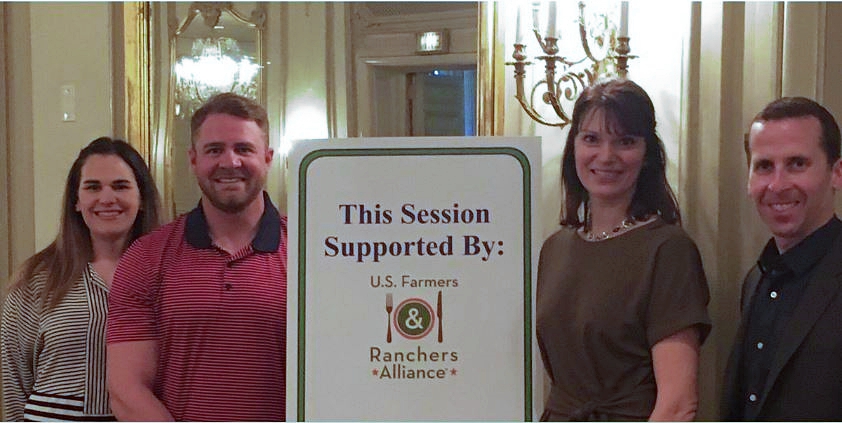Kim Kirchherr, MS, RD, LDN, CDE, FAND, ACSM-CPT |
July
12, 2019
Food for thought to inspire your next food conversation with clients and potential clients

The U.S. Farmers & Ranchers Alliance (@USFRA) hosted a panel discussion at ACSM’s 2019 International Health and Fitness Summit (#ACSMSummit) in Chicago. The panel included a scientist (@MickeyRubin), a farmer/bodybuilder (@SJSchneider10 Sam Schneider), and me (@KimKirchherr), a registered dietitian and ACSM certified personal trainer. The topics we covered ranged from farm to table, literally. Here is some food for thought to inspire your next food conversation with clients and potential clients:
- Only 2% of the population have direct familial ties to agriculture currently. With people not having direct knowledge of agriculture in their day-to-day lives, it makes sense that questions about food are becoming more common. Food questions are complex and involve the need for expertise from a variety of perspectives, which was the inspiration for our panel at the ACSM Summit.
- To get the nutrition we need, there are many “right ways” to eat.. We have a responsibility to learn more about food, nutrition and farming. Building a network of experts is important for us as health and fitness professionals, and as people who eat! We can help answer questions and connect our audiences with the nutrition experts they need in addition to us. Social media, video and other ways to connect make it easy to go directly to a farmer, dietitian, scientist or chef – true experts in the areas where we may have questions.
- When it comes to the farm-to-table conversation, there are several terms that need to be defined to help conversation and understanding. A great example of this is the word “sustainability.” For someone working on losing excess weight, can it be kept off long term? A farmer’s view would include aspects like growing/raising food to meet the demands of the population, while also working to preserve/improve natural resources and support a multi-generational family as a viable business.To a dietitian and personal trainer, this could include whether it supports personal and planetary health. This complex conversation actually includes simple ways we can all work together to improve both the conversation and the outcome. An easy way to consider “everything” is to take a moment to discuss the actual words used in these food conversations that make it easy to find the win-win-win for the planet, the person and the plants/animals. If we consistently consider this in our conversations, we will be on to something good.
- Current research hasn’t found significant difference in growing styles of food when it comes to nutrition. This basically means that however and whatever food you choose to eat, a farmer has you covered. Farmers of all types are local to where we live, and food is grown where it makes sense to do so. Illinois is not a good place to grow bananas, as an example. Regardless of what food you buy and eat, remember to wash your hands before, during and after food preparation, separate raw foods from cooked, store food properly and wash your fruits and veggies before eating them.
- Resources exist to help the conversation. Consider scope of practice, what you are passionate about and how you can build your own network of professionals to help make your responses more valuable for your clients. The following resources are a good place to start.
FDA Qualified Health Claims
FDA Definition of “Healthy”
USDA Know your Farmer, Know your Food
Grass Finished, Grain Finished Beef (with label reading information)
USFRA Agriculture 101
Foods, flavors, and recipes your state/territory is known for, and how they fit into your healthy eating style.
Cooking Methods to Preserve Nutrients in Fruits and Veggies
Isothiocyanates from Brassica Vegetables—Effects of Processing, Cooking, Mastication, and Digestion
Vitamin B12
Author:
Kim Kirchherr, MS, RD, LDN, CDE, FAND, ACSM-CPT
Kim is an award-winning registered dietitian and a certified personal trainer (ACSM). She has experience in agriculture, supermarket, media (traditional and social), hospital-based health and fitness centers, as well as outpatient medical nutrition therapy programs. She served as the Chair of the Food & Culinary Professionals Dietetic Practice Group (FCP) for 2017-2018 and has been chair of both the FCP Agriculture and Supermarket Subgroups. Kim is a past president of Illinois Academy of Nutrition and Dietetics. Both sides of Kim’s family have ties to agriculture. Her expertise lies in knowing, informing, and converging mutual goals of individuals (consumers), health professionals, agriculture experts, and retailers for better outcomes for all. You can see more of Kim at her website kimkirchherr.com
The views expressed are those of the author and do not necessarily reflect those of the ACSM.